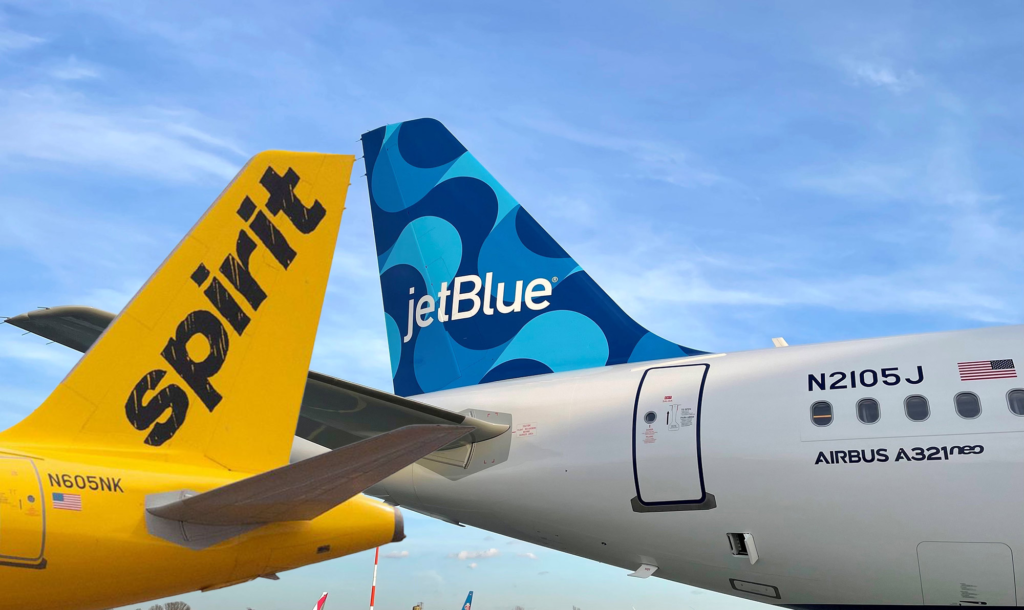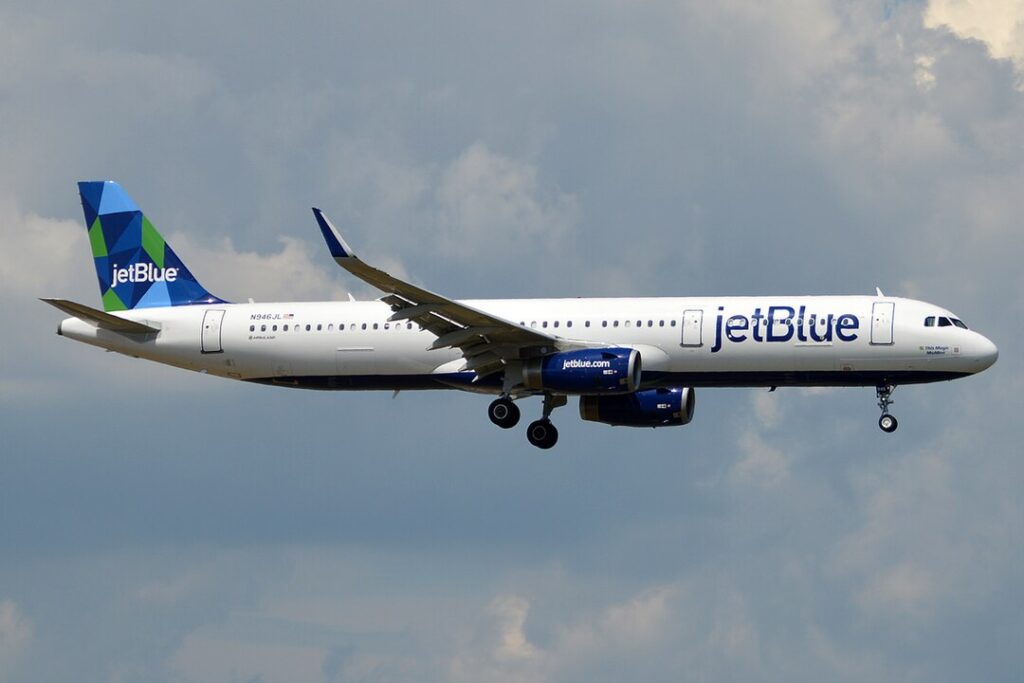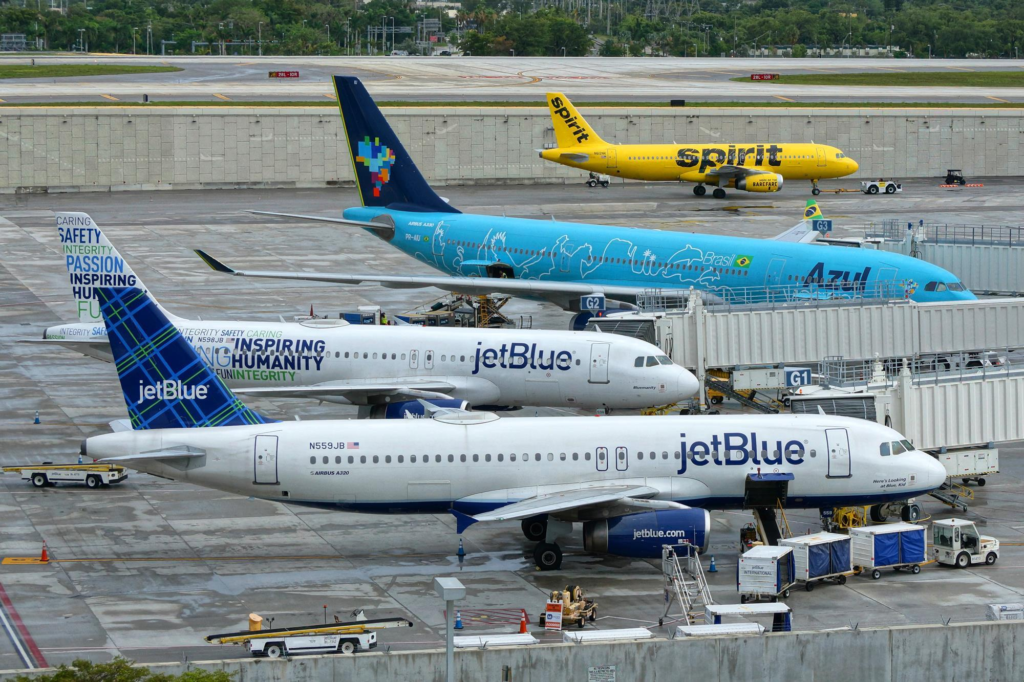NEW YORK- The imminent decision in the merger trial involving JetBlue Airways (B6) and Spirit Airlines (NK) has the potential to impact the entire airline industry significantly. Regardless of the verdict, the outcome is likely to create turbulence in the stock market for airline companies.
The proposed $3.8 billion merger aims to establish the fifth-largest U.S. airline, giving rise to a formidable low-cost entity capable of challenging the established Big Four – United Airlines, American Airlines, Delta Air Lines, and Southwest Airlines.

JetBlue-Spirit Merger: Awaiting Ruling
Anticipated in January, the judgment is described as “too close to call” by Raymond James analyst Savanthi Syth. While she perceives a greater than 50% chance of success for JetBlue and Spirit, she also acknowledges that regulatory uncertainty remains notably high.
Throughout the month-long antitrust trial, the Department of Justice (DOJ) contended that the merger would result in higher fares and fewer choices for travelers.
In contrast, JetBlue argued that the deal is pro-consumer and would empower the merged entity to compete with the dominant airlines.
The market currently lacks confidence in pricing either potential outcome, leaving stocks susceptible to significant fluctuations upon the announcement of the ruling.
Additionally, the decision could influence the proposed merger between Alaska Air and the parent company of Hawaiian Airlines, Hawaiian Holdings.
In simpler terms, a favorable ruling for the merger is likely to benefit the company being acquired, Spirit, and could positively impact Hawaiian. However, it may put pressure on the acquiring companies, JetBlue and Alaska.
Deutsche Bank analysts have observed that historically, acquirers tend to underperform during the approval and integration process in the context of airline mergers.
Investors share a similar perspective. Instances where developments increase the likelihood of merger approval, such as JetBlue agreeing to sell Spirit assets to address DOJ concerns, have typically resulted in an increase in Spirit’s stock value and a decrease in JetBlue’s.

Post-Merger Decline in Spirit Share Price
In the initial half of December, there was an increase in short interest for JetBlue, indicating traders betting against the airline’s shares. Conversely, there was a decline in short interest for Spirit, suggesting a leaning toward approval of the deal.
However, if District Court Judge William Young rejects the merger, Deutsche Bank’s Michael Linenberg anticipates a potential collapse in Spirit’s share price. He expects other airlines to generally benefit from increased consolidation, although with less drastic share price movements for the Big Four.
While the merger aims to establish the fifth-largest U.S. airline, challenging the dominance of United, American, Delta, and Southwest remains a formidable task. The quartet commanded 74% of domestic flight capacity in the December quarter, in stark contrast to the combined 10% held by JetBlue and Spirit.
Spirit has faced a challenging year from an investor perspective, marked by a series of disappointing quarterly earnings reports. Analysts foresee a loss for the ultra-low-cost carrier in each of the next five quarters.
The pending JetBlue acquisition is currently supporting Spirit’s shares, as noted by TD Cowen analyst Helane Becker ahead of the trial. She emphasizes potential significant downside if the DOJ prevails in the lawsuit against JetBlue, leading to the deal breaking.

Ruling Has Implication on Alaska-Hawaiian Merger
The potential gains for Spirit may not be as substantial as initially anticipated. The original valuation of the deal places Spirit at $33.50 per share, more than double its current market level.
However, there is speculation among some analysts that JetBlue might seek to renegotiate the deal’s price, taking into account Spirit’s performance since the merger agreement in October 2022.
The ruling also holds significance for the proposed acquisition of Hawaiian Airlines’ parent company, Hawaiian Holdings, by Alaska Air Group.
These mergers exhibit distinct characteristics, with Alaska and Hawaiian having overlap on only 12 out of 1,400 daily flights. The Department of Justice (DOJ) will thoroughly assess each merger on its individual merit before deciding whether to oppose it potentially.
Nonetheless, a Department of Justice (DOJ) setback in the JetBlue-Spirit case might increase the reluctance of the Biden administration to intervene in the Alaska-Hawaiian deal.
Conversely, a DOJ victory could bolster the administration’s stance—at least, that’s how the market is likely to interpret it.
Stay tuned with us. Further, follow us on social media for the latest updates.
Join us on Telegram Group for the Latest Aviation Updates. Subsequently, follow us on Google News.

